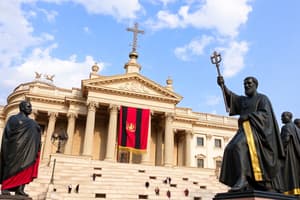Podcast
Questions and Answers
What is the central idea conveyed by the phrase "living with a tight grip"?
What is the central idea conveyed by the phrase "living with a tight grip"?
- Operating under the illusion of complete control and resisting divine guidance. (correct)
- Embracing financial responsibility and avoiding unnecessary risks.
- Maintaining control over one's emotions and avoiding vulnerability.
- Practicing self-discipline and resisting impulsive decisions.
Why did the author kneel to speak with John in the prison infirmary?
Why did the author kneel to speak with John in the prison infirmary?
- To gain a better vantage point for observing John's physical condition.
- To appear less intimidating and show John respect and equality. (correct)
- To comply with prison regulations regarding interactions with inmates.
- To create a more private and confidential atmosphere for their conversation.
What internal conflict did the author recognize in John during their conversation?
What internal conflict did the author recognize in John during their conversation?
- John's battle between pride and the willingness to accept faith and forgiveness. (correct)
- John's difficulty communicating his needs due to the presence of the guards.
- John's struggle to reconcile his past actions with his current circumstances.
- John's conflict between revealing his vulnerabilities and maintaining a tough exterior.
How does the author's perspective on seeing lights from an airplane at night change over time?
How does the author's perspective on seeing lights from an airplane at night change over time?
What lesson did the author learn from missing the opportunity to speak with the man with a cane?
What lesson did the author learn from missing the opportunity to speak with the man with a cane?
Why did the author offer his first-class seat to David, the veteran with prosthetic legs?
Why did the author offer his first-class seat to David, the veteran with prosthetic legs?
What does the incident with the woman on the plane who saw a cross in the building's shadow reveal?
What does the incident with the woman on the plane who saw a cross in the building's shadow reveal?
How does the author define living with "open hands" in the context of daily life?
How does the author define living with "open hands" in the context of daily life?
What is the main message conveyed through the anecdote about Alexis Lato and her motto "You Only Die Once" (YODO)?
What is the main message conveyed through the anecdote about Alexis Lato and her motto "You Only Die Once" (YODO)?
What does the author suggest about the timing and nature of opportunities to make an impact on others?
What does the author suggest about the timing and nature of opportunities to make an impact on others?
How did the author's parents model living with open hands regarding finances?
How did the author's parents model living with open hands regarding finances?
What does the author suggest about the relationship between talents, abilities, resources, and making a difference?
What does the author suggest about the relationship between talents, abilities, resources, and making a difference?
What was the author's initial reaction to the man with a cane at the airport?
What was the author's initial reaction to the man with a cane at the airport?
What ultimately prompted the author to approach the woman at baggage claim and offer to pray with her?
What ultimately prompted the author to approach the woman at baggage claim and offer to pray with her?
What is one of the consequences of craving money?
What is one of the consequences of craving money?
Why did the author persist in asking the flight attendant to convince David to switch seats with him, even after David initially declined?
Why did the author persist in asking the flight attendant to convince David to switch seats with him, even after David initially declined?
What underlying message does the author convey through the recurring theme of discomfort in various situations?
What underlying message does the author convey through the recurring theme of discomfort in various situations?
How does the author use the phrase "in-between" to describe opportunities for making a difference?
How does the author use the phrase "in-between" to describe opportunities for making a difference?
What did the author mean when he told the woman at baggage claim, "We might not be able to fix what people are going through, but we can be a part of their journey"?
What did the author mean when he told the woman at baggage claim, "We might not be able to fix what people are going through, but we can be a part of their journey"?
Flashcards
The Illusion of Control
The Illusion of Control
Living with a tight grip on resources, time, and talents gives a false sense of control.
The Root of All Kinds of Evil
The Root of All Kinds of Evil
The love of money can lead to making poor decisions and straying from faith.
God's Promptings
God's Promptings
Acknowledge God's leading and trust that He will use it for amazing things.
Living with Open Hands
Living with Open Hands
Signup and view all the flashcards
Give in the In-Between
Give in the In-Between
Signup and view all the flashcards
Living With Open Hands
Living With Open Hands
Signup and view all the flashcards
Make a Difference
Make a Difference
Signup and view all the flashcards
Study Notes
- Living with a tight grip on resources, time, talents, and money creates a false illusion of control, hindering one from truly living.
Encounter in Prison
- The author met an inmate named John in a prison infirmary who was heavily tattooed and shackled.
- John joked about being accused of stabbing someone.
- When asked how to pray for him, John initially requested prayer for his mother, who was going through a tough time, rather than for himself.
- Despite his external toughness, John was wrestling with emotions like guilt and doubt.
- The author shared God's love for John, explaining that Jesus sacrificed himself for him.
- John, though moved, declined to accept Jesus at that moment, but expressed he might one day and would think of the author if he did.
- The author left the infirmary with a heavy heart, sensing John was under conviction but fighting it.
The Illusion of Control
- People often fight for control over aspects of their lives, struggling to trust Jesus during difficult times and give Him their future.
- Worrying and living in fear to control uncontrollable events is common.
- Focusing on the present moment allows one to loosen their grip, open their heart, and live with an open mind and spirit, willing to follow God's lead.
- The love of money can lead people away from the true faith and cause sorrow.
- The love of money becomes problematic when you let it control your decisions, your impulses, and your actions.
Living with Open Hands
- The author's parents modeled generosity, trusting God and giving what little they had to help others.
- The disparity between the wealthy and the needy highlights the need for encouragement, hope, and the love of Jesus.
- Living with open hands allows one to make a difference in at least one person's life by using their talents, abilities, resources, and money for good.
The In-Between Moments
- While trying to make an impact, sometimes one misses opportunities due to discomfort or inconvenience.
- The author recounts missing an opportunity to connect with a man with a cane at an airport due to feeling sick and wanting to avoid a scene.
- He asked God for another chance and then encountered a veteran with prosthetic legs.
- Despite wanting to rest on the flight, the author felt compelled to offer his first-class seat to David, a veteran who lost his legs in Afghanistan.
- The author ended up sitting in coach and engaging in conversation with two women.
- One of the women shared a story of divine intervention and how maybe it meant something that I had sat down next to her.
- The author then offered to pray with her at the airport.
- Being willing to be open and not miss another opportunity allowed God to step up.
- Being ready to give can create some of the biggest moments in someone's lives.
- Be ready to give in the in-between. Sometimes these can end up being the biggest moments in our lives.
Make This Your Day
- Be open to opportunities to help, encourage, and share the message of hope that Jesus brought, even when not feeling well or wanting to be alone.
- Open your heart and give of your resources, time, talents, or finances.
Studying That Suits You
Use AI to generate personalized quizzes and flashcards to suit your learning preferences.




